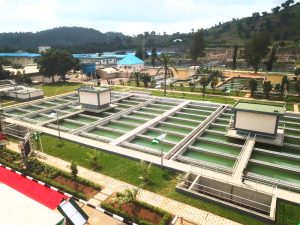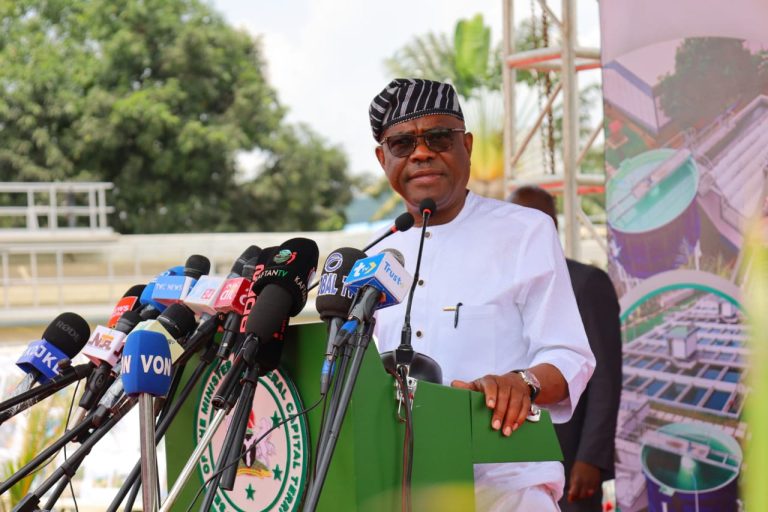By Suraju Ola
The Federal Capital Territory (FCT) Minister, Barrister Ezenwo Nyesom Wike, has officially commissioned the rehabilitated Phase II Water Treatment Plant at the Lower Usuma Dam in Bwari Area Council. The project marks a major milestone in efforts to expand access to safe drinking water and strengthen infrastructure within the nation’s capital.
Speaking at the commissioning in Abuja on Tuesday, August 19, 2025, the Minister said the project, originally awarded in 2022 for ₦50 billion, was successfully delivered under the administration of President Bola Ahmed Tinubu. He described the completion of the facility as a clear demonstration of the government’s commitment to the Renewed Hope Agenda, which places emphasis on infrastructure development and essential services for citizens.
According to Wike, the upgraded plant restores the capacity of the Phase II facility to process 5,000 cubic meters of potable water per hour, a major step towards meeting Abuja’s growing water demand.
“Water is life, and this project is essential for the residents of the FCT,” the Minister said. “By rehabilitating this treatment plant, we are increasing its carrying capacity and guaranteeing improved supply of clean and potable water to our people.”
He explained that the Federal Executive Council has already approved further rehabilitation of Phases I, III, and IV of the Lower Usuma Dam water treatment plants, stressing that these projects are part of a broader strategy to ensure long-term water security across the FCT.
Beyond the city center, Wike disclosed that over ₦90 billion has been allocated for new water projects in satellite towns such as Bwari and Karu. He said these investments are aimed at extending essential services to underserved communities, improving the quality of life, and reducing the heavy concentration of infrastructure within the Abuja metropolis.
Responding to perceptions that his administration has prioritized road construction at the expense of other sectors, Wike highlighted ongoing projects in education and rural development.
He noted that schools across rural communities are undergoing rehabilitation, and he has directed the Mandate Secretary of Education to release details of completed and ongoing school projects under President Tinubu’s administration.
“By the time the list is released, Nigerians will understand the scale of our work in the education sector,” he assured.
The Minister also revealed that the FCT’s Internally Generated Revenue (IGR) has risen significantly from ₦9 billion to ₦30 billion monthly since he assumed office. This increase, he said, has made it possible for the Administration to meet financial obligations to contractors and embark on new capital projects.
“When we came on board, IGR was ₦9 billion monthly, but today, by the grace of God, we generate not less than ₦30 billion each month. Without this, we would not have been able to pay contractors or fund new projects like this one,” Wike explained.
In a strong message on accountability, Wike vowed to resist corruption and ensure that public funds are used responsibly. He condemned the practice of civil servants awarding contracts without ministerial approval, a trend he described as “indiscipline and corruption.”
“The problem in this country is that when you fight corruption, it fights back. But we will not allow business as usual,” he said.
Wike maintained that he would only authorize payments for contracts he personally approved and insisted that those making claims of unpaid debts must provide evidence of legitimate contracts awarded by him.
The Minister outlined his broader vision for the FCT, stressing that capital projects such as roads, schools, hospitals, and water facilities must take priority over recurrent spending. He urged stakeholders to focus on development projects that impact the lives of ordinary residents rather than on frivolous expenditures.
“What matters most is providing our people with basic infrastructure—roads, schools, water, and security. That is what governance is about,” Wike emphasized.

The Minister of State for the FCT, Dr. Mariya Mahmoud, described the project as a significant milestone for the Tinubu administration. She commended President Tinubu for his unwavering support of infrastructural renewal and emphasized the need to maintain the newly rehabilitated facility for long-term use.
The Executive Secretary of the Federal Capital Development Authority (FCDA), Engr. Richard Yunana Dauda, provided a technical breakdown of the rehabilitation exercise. He noted that the Phase II water treatment plant, originally built in 2000, had deteriorated and was at risk of collapse.
According to him, the rehabilitation involved the repair and replacement of equipment in the inlet pump station,
Overhaul of clarifies and filters, Modernization of electromechanical and chemical systems
Upgrades to the water testing laboratory, Replacement of backup power generators.
With these improvements, Dauda said, the plant has been fully restored to its designed capacity of 5,000 cubic meters per hour and will now ensure water quality that meets international standards.
Wike reiterated his administration’s determination to leave behind a legacy of growth, transparency, and infrastructural renewal. He assured residents that Abuja will continue to benefit from people-centred projects that reflect the spirit of the Renewed Hope Agenda.
“I will leave office with my head high, knowing that we touched lives and transformed communities across the FCT,” he said.



